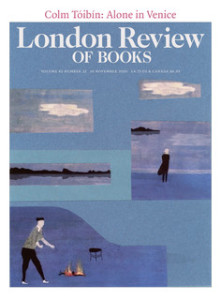London Review of Books Vol. 42 No. 22 · 19 November 2020
Written during the first wave of the pandemic with its soaring death rates made worse by the fumbling response of corrupt governments, and amid accelerating climate catastrophes, Rose’s essay, subtitled “Jacqueline Rose on Freud and his daughter”, looks at how we cope with these repeated blows. If we shut down emotionally and intellectually, “does that leave room to grieve, not just for those who have been lost, but for the broken pieces and muddled fragments that make us who we are?”
Rose takes us back to a similar moment in time: 25 January 1920 when Freud’s favourite daughter, Sophie Halberstadt-Freud, died in the last wave of the Spanish flu. A devastated Austria had lost the war; Freud himself had lost his earlier enthusiasm for his homeland’s role in the war and now supported the breakup of the Austrian Empire. With his family starving, and himself unable even to get to his dying daughter because there were no trains, Freud’s situation was eerily similar to what many experienced during our own pandemic: “the lack of state provision, the missing medical supplies, the dearth of equipment and isolation from human touch have made it feel to many for the first time that death is something of which a person – the one dying, and those closest to her or him – can be robbed.”
He turned to writing, adding the lengthy Chapter Six to Beyond the Pleasure Principle which was published later in 1920. In this chapter, he first presents the idea of a death drive in conflict with our drive for self-preservation, the life drive, deriving it from what “he had first identified in soldiers returning from battle who found themselves reliving their worst experiences in night-time and waking dreams.” He compares this repetition compulsion to his other patients and their resistance to therapy, concluding that “The urge of all organic life is to restore an earlier state of things.”
He carries this idea further to postulate an internal human need to craft our own track to the end of life, regardless of any limit for self-preservation, saying “The organism wishes to die only in its own fashion.” Thus, for victims of wars and pandemics and natural catastrophes, the randomness of their deaths robs them “of the essence of life.”
Rose’s essay continues, supplementing Freud’s ideas from another paper written during WWI, “The Phylogenetic Fantasy,” with current research on inherited trauma to look at how anxiety travels through generations, an anxiety that is a “response to an imperilled world, but also . . . a reaction to the tyranny of the powers that come to meet it.”
There is much more to this essay, and I recommend it to anyone who is looking for new insight into our current state of being. However, I was struck by the idea of an urge to restore an earlier state of things and its relevance to the stories we tell.
Books such as Robert McKee’s Story, Christopher Vogler’s The Writer’s Journey, Lisa Cron’s Wired for Story, and Larry Brooks’s Story Engineering describe a basic structure dating back to the Western world’s earliest stories. This ur-story begins with a normal world—troubled but getting by—that is disrupted in some way. Hence novelist John Gardner’s famous saying about all stories being either about going on a journey or a stranger coming to town: the two ways a world is disrupted.
The story then is about the attempts, usually by the main character, to restore their original normal world. But there is no going back, any more than there is for the soldiers reliving their nightmares. Instead, the main character must address not only the events around them but also their internal troubles, now no longer balanced but demanding change. By the end of the story, they are indeed changed, as Gawain returns to Arthur’s Court humbled and contrite after his encounter with the Green Knight, as Elizabeth Bennet enters her marriage realising that she must look beyond her first hasty judgments in order to discover real goodness.
The urge to restore an earlier state of things also makes me think of the nostalgia for a previous age that so many today have succumbed to. Not only do our stories tell us that such a return is impossible, but the image of that previous age is false, usually edited to be more attractive than it actually was. While often that false image has been deliberately created for political purposes, it is also true that our own minds chip away at our memories, according to recent research, subtly changing them each time we recall an incident.
We cannot go back to the time before the pandemic, and how we remember it may not even be reliable. We have been changed by this experience, in ways we may not yet recognise, and we are not yet at the end of it. Eventually, I believe, we will turn to stories to understand, help us grieve, and put the broken pieces back together.
What are you reading or listening to that is helping you better understand this extraordinary time?

